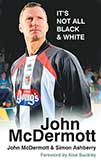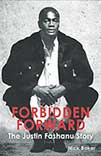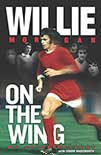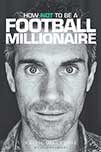 by John McDermott
& Simon Ashberry
by John McDermott
& Simon Ashberry
The History Press, £9.99
Reviewed by Pete Green
From WSC 326 April 2014
In many ways John McDermott’s book is the archetypal lower-league autobiography. You have contractual wrangles and several relegations shot through with moments of glory, laddish hijinks on pre-season tours of Scandinavia, a touching sense of wonder when the player crosses paths with his contemporaries from the Premier League and transcription from interview tapes with a minimum of editorial effort. Rather than leave for a new club every chapter, though, McDermott spends all of his 21-year, 750-match career with Grimsby Town.
This is what makes his story remarkable. He is, perhaps, the last of his kind – not just at Blundell Park, but anywhere. McDermott was long recognised as one of the best full-backs outside the top flight, having perfected the art – as we Town fans sometimes called it – of defending without tackling. “The best defender on any team is the one with the cleanest pair of shorts,” he is told as a young player, and “that became my forte, staying on my feet rather than sliding in rashly.” It’s Not All Black & White sounds only the faintest notes of wistfulness as the author reflects on transfer approaches from Ipswich, Bradford and Watford – all three of whom go on to reach the Premier League. An England scout arrives early on but McDermott has just been sent on a cross-country run by manager Mick Lyons and has a stinker.
As a schoolboy McDermott travels down from his native Middlesbrough for a trial and never looks back. He speaks of his club and adopted hometown with gentle rather than showy affection (once asked by a national paper why he stayed with Grimsby, he cited the area’s low house prices). Over two decades managers come and go, and with them a variety of methods. Lennie Lawrence takes Town to the bottom of the second tier but McDermott admires his futuristic approach to fitness. More typical is the illustrious Alan Buckley, who throws down the scouts’ opposition report and says: “Right, read it if you want but I’m not bothered if you don’t… it’s all about us.”
McDermott’s situation eventually prompts a sad and telling reflection on footballers’ pay. Wages reflect only what it costs to retain a player – not his ability. When an ageing star is performing superbly these are not the same. Supporters vote McDermott player of the year, but at the age of 36 approaches from elsewhere are unlikely, so the then Grimsby chairman John Fenty (who essentially retains the role to date, in all but name) cuts his weekly pay from £650 to £300. Witness a club legend scrabbling around for odd jobs at the ground to bring in an extra £50 a week, and you see the kind of house Fenty has been running.
For all the talk of McDermott’s loyalty, the most striking trait in evidence here is his dignity. He speaks of Fenty with a surprising lack of bitterness and declines to settle old scores with the senior players who bullied him as an apprentice. In 2009, after retiring, he receives the PFA Merit Award – bestowed previously upon the likes of Jimmy Armfield and Alex Ferguson – and his humility shines on. As with the playing style, so with the man: never lunging in, always staying upright. He’s Grimsby’s greatest ever and his story is compelling.
 The Justin Fashanu story
The Justin Fashanu story
by Nick Baker
Reid Publishing, £14.99
Reviewed by Paul Buller
From WSC 326 April 2014
How much is there left to say about a man of whom so much has already been said? This biography of Justin Fashanu will certainly not be the last. The sleeve notes of Nick Baker’s Forbidden Forward promise more detail than ever before and to identify “those who are to blame for his untimely death”.
That salacious hook thankfully fails to live up to its promise and is a distraction from what is a comprehensive insight into Fashanu’s life, from birth through to the moment he took his own life aged just 37, with intimate contributions from those acquainted with him along almost every step of the way.
Described as “a hero to some, a conman to others and an enigma to most”, Fashanu’s story is that of a young black footballer’s struggle to make it in his career and life, with the added burden of coming to terms with being a gay man in two unforgiving environments – professional football and evangelical Christianity.
This could be the story of many a young player: catapulted to stardom as a teen, treated brutally by a new manager (Brian Clough), terrible with money but fond of the high life. But it’s the mix of circumstances that make Fashanu’s tale so engaging. He was a striker of supreme ability with a penchant for on-field violence; an intelligent, gentle, well-spoken young man off the pitch who was both introvert and extrovert, aloof and needy, avaricious and generous.
It’s a shame then that what should be a fairly fluid tale jars at regular intervals. The story of his early idyllic life in sleepy rural Norfolk, where Fashanu grew up boxing and playing endless football, is brought to a screeching halt by clunky metaphors and segues: “While other kids his age were down the arcade or hanging out on street corners smoking, Fashanu was perfecting his punch and smoking opponents” is but one of many that get in the way.
The author feels the need to remind us too often that life will not always be as rosy as the early years: portents of the doom are waiting at every opportunity, mostly at the end of chapters in what feels like an unnecessary plea for us to keep reading.
Baker also occasionally offers his opinion on Fashanu’s state of mind and the treatment he received as a black and openly gay man but it’s more pub psychology than insight. When we’re treated to a graphic description of how the book’s subject took his own life we’re told, twice, what he was thinking as he he did it. Fashanu was alone at the time, left only a simple note and told no one of his intentions, yet the author writes as if he was there.
In the end, no one is blamed for Fashanu’s death, but don’t take that as a spoiler. Beyond the publisher’s hype and some slack editing, the book gives an insight into a tumultuous life that remains as intriguing now as it did when Justin Fashanu was alive.
 by Willie Morgan with Simon Wadsworth
by Willie Morgan with Simon Wadsworth
Trinity Mirror, £16.99
Reviewed by Graham McColl
From WSC 326 April 2014
If the purpose of this book were to rid Willie Morgan of the image of being George Best’s doppelganger, it sets about it in a strange fashion. Behind the main picture on the cover, faint background images show Morgan at various stages of his life from babe to footballer but, inexplicably, the only other person amid these images is Best, Morgan’s late 1960s and early 1970s fellow winger at Manchester United. On the inside back flap, there is a picture of Morgan in a United strip… along with Best. Inside the book there is only one advertisement for another publication – a page-sized promotion for The Best of Best, a “souvenir magazine” from the Daily Mirror that boasts “lost images” of “The Genius As You’ve Never Seen Him Before”.
George is given further prominence once the story begins, receiving a mention on more than 40 pages. Yet in Bestie, George’s own 1998 authorised biography, Morgan features only twice, both times derogatorily. “Morgan always seemed a bit jealous,” Georgie says. Morgan, in contrast, on first mention of Best, says, touchingly, that their lives would be “intertwined”.
Pushing this book on the back of Best, as someone has decided to do, is unnecessary. Morgan is an engaging storyteller, a happy-go-lucky individual with an underlying toughness forged, as he relates in excellent detail, through his upbringing in Sauchie, the Clackmannanshire mining village. He is also capable of some fabulous self-promotion: “Along with Geroge Best [who else?], I was one of the two biggest stars in football,” he says of mid-1968 – the era of Eusébio, Bobby Charlton, Bobby Moore, Jimmy Johnstone, Pelé, Denis Law et al.
One early inconsistency almost brings the tale to a shuddering halt, though. Willie states that his dad, after a theological dispute with a Canon Matthews in Sauchie when Willie was around 12, had “wanted to kill” Matthews, and never went to church again. Yet, when Willie turns 15, his dad keeps him on at school, on the advice of a priest, rather than sending him down the pit, because: “My dad was never one to go against the wishes of the church.” This seeming inconsistency is more than a pedantic niggle. If Willie goes down the mine, he doesn’t play schools football, doesn’t get spotted by Burnley FC, doesn’t become a pro footballer, doesn’t write this book.
Get over that hurdle and the book lives up to the breathless cover blurb of “hundreds of tales” about “the hell-raising Best [him again] and a host of others”, although the story of Scotland’s 1974 World Cup is shockingly light on insider detail. Things peter out with post-playing tales of socialising with people such as Rod Stewart which does at least bring some amusement, with a schoolboyishly eager Stewart asking Willie, as they attend a match, to relate each stage of his own pre-match professional routine. “I would probably be picking some horses out right now for the next race,” Morgan replies. His yarn is like that all the way through and plentifully enjoyable for it.
 by Keith Gillespie
by Keith Gillespie
Sport Media, £16.99
Reviewed by Robbie Meredith
From WSC 326 April 2014
The advance publicity for, and newspaper serialisation of, Keith Gillespie’s autobiography concentrated heavily on his prodigious gambling habit. Given that Gillespie estimates he squandered around £7 million over the course of his career this is understandable, but How Not To Be A Football Millionaire is much more than a tale of beaten dockets. To his credit, Gillespie refuses to wallow in self-pity or to portray himself as a particularly likeable man.
Rather he comes across as intelligent, complex and contradictory – despite a lifelong, and ultimately damaging, habit of refusing to face up to conflict or responsibility, he’s refreshingly willing to put the boot in now his career is over. He’s withering about Stuart Pearce’s “Psycho” image, and there’s a telling depiction of Graeme Souness striding around Blackburn’s training ground in nothing but a towel and formal shoes, but his deepest scorn is reserved for his former manager at Sheffield United, Kevin Blackwell. There’s an elongated and blackly comic account of his time working under Blackwell, which culminates in a series of late-night abusive text messages.
Gillespie’s chronic gambling habit is nurtured at Old Trafford early in his career, where he gladly takes on the task of placing bets for Alex Ferguson, but it reaches its nadir at Newcastle. One of the most pathetic images in the book, although I doubt if he sees it that way, is of Gillespie spending endless afternoons on his sofa – phone in one hand and Racing Post in the other – placing huge telephone bets on the horses. A crisis comes when he loses £62,000 in two days, but the strengths and flaws in Kevin Keegan’s management are apparent when, rather than imploring his player to seek help, he organises a club payment to Gillespie’s bookie to clear the debt; a misguided act which, yet again, prevents the player from taking charge of his own life.
Money, clubs and marriages alike then come and go, while no night out is turned down. “Anything,” he puts it, “to relieve the boredom.” Gillespie was a very good player, but it’s tempting to wonder how much better he’d have been without being out on the lash three nights a week. He remembers only two games, for Newcastle against Barcelona and Northern Ireland’s famous win over England in 2005, where he actually sat in after a match.
A typically hasty and mistaken attempt to make a quick buck by investing in film schemes leads to bankruptcy late in his career when he can least afford it. However, this ultimately forces Gillespie to counter the failings in his own character, not least by opening the numerous final demand envelopes cluttering up his living room. It is too cliched to claim that Gillespie achieves redemption at the end of his tale. Rather he gains the uncertain gift of a better understanding of himself. In doing so, he provides a compelling glimpse into the dark void inherent in the modern age of adrenaline-fuelled football celebrity.